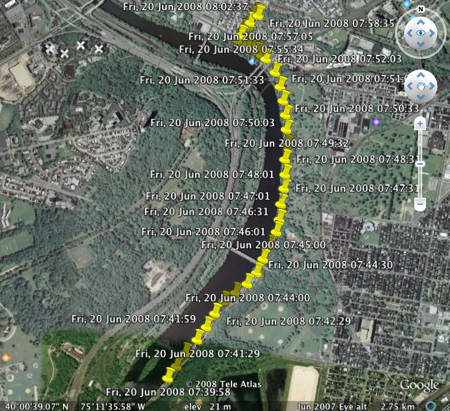
Most smartphones slated for release over the next 12-months include a GPS receiver, built in. After that, it will be a marked failure to not include a GPS in a phone. The functionality that comes with GPS is outstanding – mapping, directions, location based experiences, etc. We’re about to enter an age of advancement in technological capabilities that we’re just beginning to imagine.
Consumers are moving to smartphones. The hottest smartphones (iPhone 3G, BlackBerry Bold 9000, most of Nokia’s Symbian and HTC’s Windows Mobile offerings) all include GPS and an exposed API for developing applications utilizing their hardware. Anything people can conceive of for location based mashups will be coming (more on these mashups in later posts)…

Here’s a first application…
BlackBerry is a leader in mobile phone GPS. Recently a few services that announce the location of one’s phone emerged. Initially these were billed as a sort of low-jack for one’s phone, a security service for the insecure (or those who want to spy on their kids, etc).
I decided to try a few of these. Most felt slimy, like, “you always know where your phone is, and you could also know where your wife is!” … I don’t know about you, but my phone is loyal and doesn’t run off with strangers… And I trust my wife far more than a phone.
My goal with trying these services was to mash Twitter, Pownce, Facebook, and other social networking services with my location. Such a mashup will allow me to share my real-time location with all friends. I came across BlackberryTracker.com. Much like the others, the idea is to provide you with the location of your phone. However, they have something the other’s don’t… Facebook and Google Earth integration (as well as a drop-dead-simple semi-RESTful API).
Friends can pinpoint me down to the meter on my Facebook profile, updated every 30 seconds. To be honest, it feels strange to openly publish this data. Security, and lack thereof, has us believing we shouldn’t share such information. But this fear is caused by the exception and not the rule. And in reality, my location in public isn’t private. Additionally, there are laws and common courtesies we live by, and I trust that people are inherently good.
Soon these services will be in the mainstream. Everyone will be able to pinpoint the location of anyone. Let me emphasize that… Soon everyone will be able to pinpoint the location of anyone. Not publishing your location will be like not having a mobile phone.




